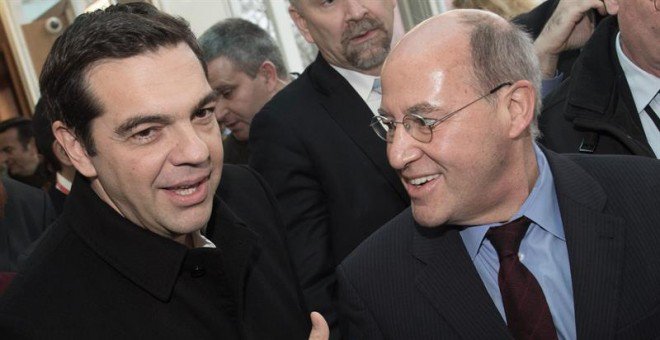Analysis
Anti-austerity forces chart path forward in European Union
With German elections looming, Europe’s left-wing party met in Berlin and elected a key Linke politician as its leader.

The Party of the European Left (EL), which concluded its fifth congress Sunday in Berlin, has vowed to radically call into question the treaties underlying the European Union and re-establish the crisis-ridden European integration project.
The party’s pledge comes in the midst of a new standoff that pits the Greek government against the Community institutions, obedient as always to the will of German Finance Minister Wolfgang Schäuble. The bone of contention is Athens’ decision to raise pensions, a move roundly celebrated at the congress in Berlin.
“We are determined to defend the rights of the Greek people, particularly the poor, those who receive low wages and the unemployed,” said Greek Prime Minister Alexis Tsipras, a leader of the party and EL’s nominee for president of the European Commission.
The situation, however, is not easy. The balance of power remains unfavorable to the anti-austerity forces. And this is the key point that returns in almost all the speeches of the leaders of the 25 national parties that make up the EL: how to succeed in countering the hegemony of neoliberal government forces that seem to be multiplying, from the German extreme right party Alternative für Deutschland to Greece’s own Golden Dawn.
The left has exhausted its options in peripheral countries: Greece, Spain, Portugal and Ireland. Now all eyes are on Germany, which will hold elections in 2017 that for the first time since reunification offer the option of a progressive breakthrough. Angela Merkel is no longer invincible, and the Social Democrats have finally considered an alliance with Linke (and the Greens). The end of Merkel-Schäuble dominance is the necessary, but certainly not sufficient, condition for a leftward swing.
It is no coincidence, then, that EL on Saturday elected as its new leader Gregor Gysi, a key figure in the Linke. He succeeds the Frenchman Pierre Laurent, general secretary of the French Communist Party, who had been at the help of EL for six years. The charismatic Gysi is among the most pro-European of the German left leaders: They’re all well aware of the differences with the other key figure in his party, Sahra Wagenknecht, who’s much more skeptical about the possibility of keeping alive the euro and the current E.U. political institutions. Gysi is also much less prone to alliances with the Social Democrats. But such differences are found among all the organizations gathered under the umbrella of EL, and Gysi will have the difficult task of trying to reconcile the factions. He certainly doesn’t lack the experience and the ability to do it.
From Italy, the Communist Refoundation Party took part in the Congress, which alongside The Other Europe with Tsipras, an Italian left-wing coalition, was the only Italian political force fully aligned with EL.
The balance may be in the hands of the Liberals leader Guy Verhofstadt of Belgium, but also the right-wing forces like UKIP’s Nigel Farage and the National Front’s Marine Le Pen. But there is another possibility: a “grand coalition” style agreement that sees the European People’s Party win the presidency of the European Parliament, “surrendering” to the Party of European Socialists the presidency of the European Council (the summit of Heads of Government), a position currently held by the Polish Donald Tusk.
Originally published at http://ilmanifesto.info/il-fronte-anti-austerita-si-incontra-a-berlino/ on 2016-12-18
